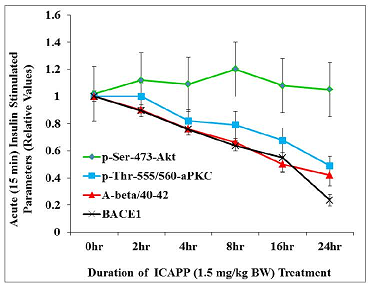Competitive Advantages
- Reduces both hyperinsulinemia & AD pathology
- Blood-Brain Barrier permeable
- Bimolecular specific inhibitor
- Prevents neurodegeneration
Summary
Numerous conclusions obtained from clinical data indicate a link between insulin resistance and an increase in Alzheimer’s disease (AD) susceptibility. An overexpression of brain atypical Protein Kinase C (aPKC) by insulin leads to increased hallmarks of AD such as beta plaque and neurofibrillary tangles. Current treatments for hyperinsulinemia only modestly improve it while neglecting to address the indirect effects these insulins on the brain. The inventors have demonstrated that ICAPP, an aPKC inhibitor, has the capability to cross the blood-brain barrier and block those same effects in the brain. Thus, ICAPP can be used to specifically block aPKC and aPKC-dependent processes. This treatment has the ability to reverse adverse effects of hyperinsulinemia and other aPKC activators that promote development of neurodegenerative diseases such as AD.

Novel treatment of Neurodegenerative Diseasses and Hyperinsulinemia
Desired Partnerships
- License
- Sponsored Research
- Co-Development